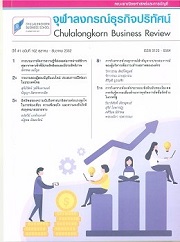A Critical Incident Analysis from Experiences of Executives on Organizational Resilience
Main Article Content
Abstract
It is inevitable for organizations to face crisis. Resilience, at an organizational level, describes the inherent qualities which enable organizations to plan for, response to and recover from emergencies and crises. This qualitative research aims to study organizational resilience in businesses after crisis. Data were collected from high-level executives who are the key informants during the experience of significant crisis within organizations in diverse small and medium enterprises (SMEs) in Thailand. Critical incident technique (CIT) was employed to study situations from the viewpoints of executives and to look for the factors that contribute to organizational resilience. The results show that (1) Executives do not prepare and plan in advance in order to achieve organizational resilience, (2) The important factor of resilience is the organizations’ ability to adapt, including leadership, networking and relationships, staff engagement, innovation and creativity, and (3) Some executives believe that luck and mindfulness plays a role in the organizational resilience or in their ability to survive and recover from crisis.
Article Details
Opinions and discussions in papers published by the Creative Business and Sustainability Journal (CBSJ) are deemed as personal opinions and the responsibility of the writers. They are not the opinions or responsibility of the Chulalongkorn Business School of Chulalongkorn University.
Papers, content, information etc. appearing in the Journal are deemed to be the copyright property of the Chulalongkorn Business School of Chulalongkorn University. Anybody or any organization that wishes to publish any part of them or use them in any way must obtain written permission from the Chulalongkorn Business School, Chulalongkorn University.


